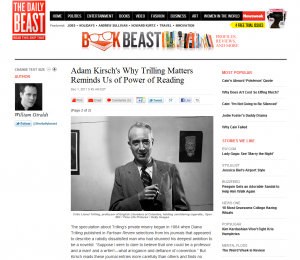A new essay or book review by critic William Giraldi has become something of an event. In a world where bloggers discuss how they “feel” about a book, and the online literati praise every new novel as if it were Ulysses, Giraldi has become the adult in the room, reminding us what true criticism can and should be.
In September Giraldi wrote “Letters to a Young Critic” in The Daily Beast after a review of his was singled out for being too negative. His Daily Beast essay was chock-full of no-nonsense opinions guaranteed to make him persona non grata on Twitter and in trendy Brooklyn bookshops:
“Much of what you will review will be written by those who have emerged from the MFA mill and who have been Pavloved into believing that every effort, no matter its anemia or inertia, deserves praise because the writer tried so hard and cares so much. You’ll be confronted by the preposterous sense of entitlement that the professionalization of writing has brought about…Don’t pander to the ‘literary’ snipes who live their dreary lives online, that legion of wonks who are mere tourists in the land of literature.”
In an age that rejects objective truth and vilifies judgment of any kind, Giraldi insists that there are objectively bad books, books that drag us all down as writers, readers and human beings, and that a critics’ obligation is to call a spade a spade. “Relax your standards in literature,” he writes, “and the relaxation of other standards will follow.” In the same vein, T.S. Eliot wrote that the function of criticism was “the common pursuit of true judgment.” (The problem of making objective artistic judgments in the modern world is something I wrote about for Full-Stop Magazine in June).
At the end of the essay Giraldi provides a kind of syllabus of great essays and books that any would-be-critic should read and ponder.
On November 30 Giraldi returned with a review in the Los Angeles Review of Books called “Rotten Reviews Redux: A Literary Companion.” Like his essay in September, this piece is full of wisdom and tough-love gems for the online literati. Giraldi surveys the enduring legacy of E.M. Forster’s book Aspects of the Novel along with the almost-forgotten one by critic Percy Lubbock The Craft of Fiction. He also focuses on the “pervasive suspicion that the best literary comment is always penned by those who are masters of the genre they comment on.” But, perhaps even more importantly, the review is worth reading because Giraldi’s acerbic wit is on full-display , and in the PC-world of book reviewing, there is nothing more refreshing. A sampling:
“A world with no deservedly antagonistic reviews would be a literary Disneyland: a wretched uniformity of pleasantness.”
“What a critic likes and feels is immaterial; it’s what a critic sees and thinks that matters. But that is precisely what you’ll find spattered across the Net and in many a newspaper east to west: unlettered opinions with scarcely more authority than the feral scratching in Cro-Magnon’s diary.”
“Literature to these online cabals is a social event and not an artistic endeavor; they congregate to swap recipes of cuisine no discerning person would ever care to eat. The idea that a novel can be garbage, and that a critic has the imperative to call it such, is anathema to their aspartame outlook; these vast middle-strata scribes have turned to writing, apparently, because Habitat for Humanity is too demanding.”


![By Allenginsberg_cropped.png: *Allenginsberg.jpg: MDCarchives derivative work: Morn (talk) derivative work: Morn (Allenginsberg_cropped.png) [CC-BY-SA-3.0 (www.creativecommons.org/licenses/by-sa/3.0) or GFDL (www.gnu.org/copyleft/fdl.html)], via Wikimedia Commons](http://upload.wikimedia.org/wikipedia/commons/2/22/Allenginsberg_cropped.jpg)